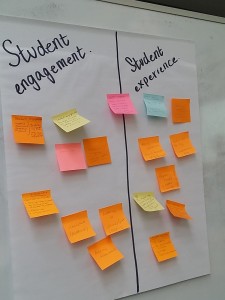 In the higher education context, the ‘students as researchers’pedagogical approach supports “students in their engagement with undergraduate research within and/or beyond the formal curriculum with the aim of furthering their own knowledge and understanding, and in some cases contributing to, the broader knowledge base of their discipline” (Walkington, 2015: 5).
In the higher education context, the ‘students as researchers’pedagogical approach supports “students in their engagement with undergraduate research within and/or beyond the formal curriculum with the aim of furthering their own knowledge and understanding, and in some cases contributing to, the broader knowledge base of their discipline” (Walkington, 2015: 5).
At BU, research underpins our teaching and professional practice, in line with our commitment to Fusion. Furthermore, a number of academics in different faculties engage with research within and outside the curriculum, especially when their subjects lend themselves to research projects as learning/assessment method (an example would be project management). In terms of university-wide arrangements, the students as researchers pedagogy is tackled through three main schemes:
- The Student Research Assistantship Programme, in which undergraduate students are involved in co-curricular research-intensive projects under the direction of a BU academic. Contact: Rachel Clarke, KE Adviser sra@bournemouth.ac.uk. This scheme has been evaluated by CEL through the project Assessing Undergraduate Research Assistants’ Learning through Participatory Methods (AURAL).
- The Student Project Bank, based on the successful model of a science shop, which is a collaboration between external organisations and BU students. Our students get to work on a live project with the potential for real-world impact. The organisations get the opportunity to benefit from our students’ knowledge, skills and creativity while gaining valuable insights into their specific project area. Contact: Charlene Parris, Project Coordinator spb@bournemouth.ac.uk
- An Annual Undergraduate Research Conference. In previous years, the university held the Showcasing Undergraduate Research Excellence (SURE) Conference. In 2017, the University is hosting the British Conference of Undergraduate Research (BCUR) on 25 and 26 April.
Interested? Here are some further resources:
- If you want to follow the conversation across the sector, join the JISC mailing list on Student as Researchers Schemes.
- An interesting podcast episode from the Society for Research into Higher Education featuring an external project involving student researchers can be found here.
- Professors Mick Healey and Helen Walkington publish constantly on undergraduate student research. Prof Healey’s website, in particular, has a number of useful resources freely available.
- The journal Council on Undergraduate Research Quarterly is an academic outlet dedicated to this topic.
Feel free to share other useful resources in the comments.

Jacqueline Priego is a research fellow at BU’s Centre for Excellence in Learning, having previously curated the research blog Favelas@LSE. She has worked in social research for over nine years, specialising in qualitative and mixed-methods. Jacqueline is a CAQDAS trainer and consultant with particular interest in participatory and creative methods. She tweets @jacqpriego








